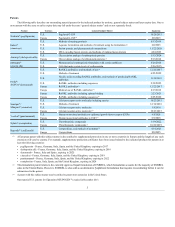Amgen 2013 Annual Report Download - page 21
Download and view the complete annual report
Please find page 21 of the 2013 Amgen annual report below. You can navigate through the pages in the report by either clicking on the pages listed below, or by using the keyword search tool below to find specific information within the annual report.
Blinatumomab
Blinatumomab is an anti-CD19 x anti-CD3 (BiTE ®) bispecific antibody. It is being investigated as a cancer treatment.
A phase 3 study in adult patients with relapsed/refractory of ALL is ongoing. Phase 2 studies in adult patients with relapsed/refractory and minimal
residual disease of ALL and a phase 2 study in adult patients with NHL are ongoing.
Brodalumab
Brodalumab is a human monoclonal antibody that inhibits the interleukin-17 receptor. It is being investigated as a treatment for a variety of
inflammatory diseases. Brodalumab is being jointly developed in collaboration with AstraZeneca Plc. (AstraZeneca).
In 2013, phase 3 studies evaluating brodalumab for the treatment of psoriasis completed enrollment and are ongoing. We completed our phase 2 study in
psoriatic arthritis in 2012. A phase 2 study for the treatment of asthma is ongoing.
Denosumab
Denosumab is a human monoclonal antibody that specifically targets a ligand known as RANKL (that binds to a receptor known as RANK) which is
a key mediator of osteoclast formation, function, and survival. It is being investigated across a range of conditions including osteoporosis, treatment-induced
bone loss and numerous tumor types across the spectrum of cancer-related bone diseases, including hypercalcemia of malignancy.
Prolia®
In August 2013, we submitted a marketing application to the EMA for Prolia ® for the treatment of osteoporosis in men at increased risk of fracture.
A phase 3 study of Prolia® for the treatment of glucocorticoid-induced osteoporosis is ongoing.
XGEVA®
In 2013, XGEVA® was approved by the FDA for the treatment of giant cell tumor of bone in the United States.
Phase 3 studies for the delay or prevention of bone metastases in patients with adjuvant breast cancer and prevention of SRE in patients with multiple
myeloma are ongoing. A phase 2 study for hypercalcemia of malignancy was completed in 2013. A phase 2 study in non-small cell lung cancer is ongoing.
We decided not to pursue our marketing application to the EMA for XGEVA® to treat men with castration-resistant prostate cancer at high risk of
developing bone metastases.
Evolocumab
Evolocumab is a human monoclonal antibody that inhibits Proprotein Convertase Subtilisin/Kexin Type 9 (PCSK9). It is being investigated as a
treatment for dyslipidemia.
In December 2013 and January 2014, we announced results from five phase 3 lipid lowering clinical studies evaluating evolocumab as a monotherapy,
in combination with statin therapy, in heterozygous familial hypercholesterolemia, in statin-intolerant subjects, and in combination with optimized lipid
lowering therapy in a 52 week safety and efficacy study. All five of these studies met their primary endpoints.
In a separate phase 3 study of our devices for use in combination with evolocumab, 95 percent or greater of the 164 patients enrolled were able to self-
administer at least one full home administration of evolocumab 420 mg subcutaneously by one injection with an automated mini-doser or by three injections
with a standard spring-based autoinjector. Reductions in LDL-C were comparable with both devices.
Additional phase 3 studies to evaluate evolocumab for cardiovascular outcomes, in homozygous familial hypercholesterolemia, in statin-intolerant
subjects, and with intravascular ultrasound are ongoing. Discussions are ongoing regarding timing for filing with various regulatory authorities for
evolocumab. In the United States, for example, the timing for filing will depend on our having achieved appropriate progress in our ongoing outcomes study.
Rilotumumab
Rilotumumab is a human monoclonal antibody that inhibits the action of hepatocyte growth factor/scatter factor. It is being investigated as a cancer
treatment.
A phase 3 study for the treatment of gastric cancer is ongoing.
15
























